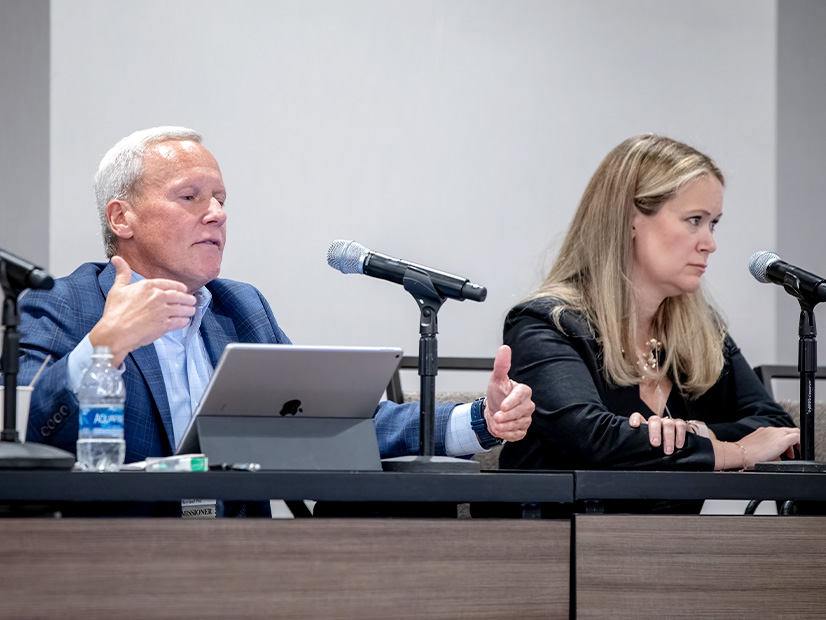
COVINGTON, Ky. — The Organization of PJM States Inc. (OPSI) heard calls for increased transparency and new RTO governance rules at its annual meeting Oct. 17.
“Our energy sector is at a critical turning point, as renewable energy is more affordable, more reliable, more in demand than ever before and it is growing exponentially,” Sen. Edward Markey (D-Mass.) said in a pre-recorded video for the meeting. “And we know we need more power lines to bridge the gap between clean power and the cities and towns that need it. We need a 21st century grid, not one recognizable by Thomas Edison, which is the one we have right now.”
He said the Connecting Hard-to-reach Areas with Renewably Generated Energy (CHARGE) Act he sponsored in the Senate in July would increase public access, increase accountability, require independent RTO boards and limit “revolving door” appointments. He said the bill would also aid the clean energy transition while promoting reliability by requiring transmission planners to consider grid-enhancing technologies and account for severe weather scenarios, establish interregional minimum transfer requirements and build on the interconnection rules FERC put in place with its Order 2023. (See Dems Introduce Bill on Transmission Planning, RTO Transparency.)
“When operators get in a room and design the future grid, the doors are often closed to activists, to environmental justice groups and the general public. That has to change. My bill would require transparency and accountability in voting,” Markey said.
Study Author Presents Recommendations on RTO Governance
The meeting also featured a discussion with Ari Peskoe, director of the Electricity Law Initiative at Harvard Law School, who authored a report last month arguing that current RTO governance preserves the status of larger incumbent market participants. The session was moderated by Michael Richard, of the Maryland Public Service Commission, and former FERC Chief of Staff Pamela Quinlan, principal of GQ New Energy Strategies — which she founded with FERC Chair Richard Glick this year.
The report, titled “Replacing the Utility Transmission Syndicate’s Control,” said representation of new and smaller market participants can be improved by revising the way RTO board members are selected, reworking membership sectors and expanding state and RTO filing rights.
Peskoe argued that the creation of a sixth member “innovation sector” would address the dilution of market entrants seeking to introduce new technologies that haven’t been supported by larger companies he said dominate the stakeholder process, particularly in the lower committees, where they can use affiliate voting.
The report says the new sector could include “advanced transmission technology providers, distributed energy resource aggregators and storage developers.” It notes that the commission issued a Notice of Proposed Rulemaking in 2002 that contemplated the six RTO membership categories, including an “alternative energy provider” sector (RM01-12).
Peskoe said FERC has pushed back against governance structures that give incumbent transmission owners the upper hand, particularly with orders related to storage and distributed resources. However, he said the commission hasn’t connected the dots showing a connection between RTO decision making and the influence of investor-owned utilities.
The report states that RTOs’ planning processes can give transmission owners an advantage in proposing projects and defining needs as local to limit the risk of a project being awarded to a non-incumbent developer through a competitive process. The amount of information available for supplemental projects at PJM’s Transmission Expansion Advisory Committee has been an ongoing concern for state advocates.
He also said the transmission owners’ filing rights — and the limited opposition their rate filings have seen from RTOs — subvert regional governance. He suggested that expanding RTOs’ filing rights over regional cost allocation and local planning, as well as giving states filing rights, could counterbalance the special filing rights incumbent TOs possess.
Quinlan asked Peskoe what role the Independent Market Monitor has to play in moderating incumbent advantages and whether a counterpart on the transmission side could be a solution to the influence utilities have. He said the monitor does call out market design issues he believes should be addressed, but his recommendations have not always been adopted by the RTO and stakeholders.
He could envision a more limited role in the local planning process for a monitor to ensure the process isn’t discriminating against any participants and to produce independent reports on the state of the network.
Jason Barker, Vitol’s vice president of regulatory affairs, said PJM creates detailed voting reports showing how individual companies and sectors voted at the higher standing committees. He also argued that incumbent bias and the ability of larger companies to have staff at stakeholder meetings are counterbalanced by organizations that help members stay informed.
Peskoe said he isn’t sure third-party representation and education are enough to counter the influence that companies with the resources to have representatives in the room wield in the stakeholder process.
LS Power Senior Vice President of Wholesale Market Policy Marji Philips said she doesn’t believe companies that have not made significant investments in the PJM markets and region should have the same access as participants who have.
Peskoe responded that governance design should be focused on promoting competition, part of which includes displacing incumbents.
“We actually need to elevate new players more because the deck is stacked against them,” he said.



